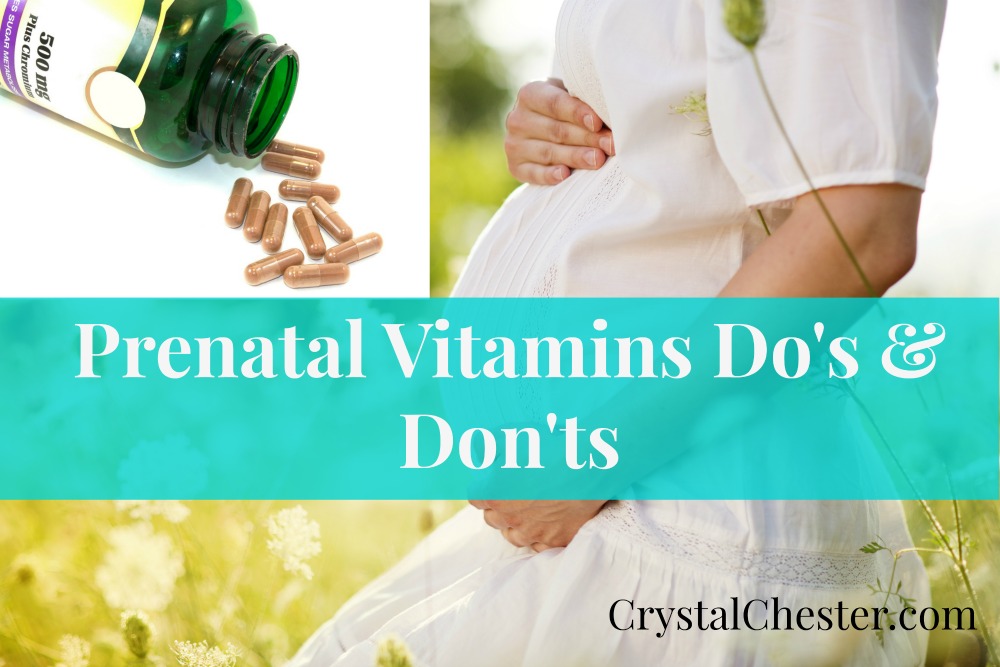While the prenatal vitamin is the basic supplement recommended to all expectant mothers, 1. know not all prenatals are created equal (grab your prenatal vitamin & check the ingredients!) and 2. there are other important supplements that should be taken to best support mama and baby. According to the research, yes take a prenatal multivitamin but consider taking other supplements as well to help fight neurological diseases, boost your mood & improve sleep, improve cognitive function and help with a variety of digestive issues.
Top Recommended Prenatal Supplements
Prenatal Multivitamins with Folate
Let’s face it, we know we’re supposed to eat 2 servings of fruits, 3-4 servings of vegetables, consume lean meats, healthy fats and of course loads and loads of water every day, especially when pregnant. It can be a tough goal to hit pregnant or not. As a general rule it’s a good idea to take a prenatal multivitamin to cover any nutrient deficiencies mama may have or encounter. Kindly note that taking a daily prenatal vitamin does not substitute eating a healthy & balanced diet. The prenatal vitamin serves as a trusty backup to cover your bases if, and when, you can’t get all the needed nutrients in your diet.
Choose a prenatal multivitamin that contains folate, not folic acid. Folate is a B vitamin that has been linked to reducing the risk of neural tube defects. Mom’s body, and the growing baby need folate to make DNA, for the production of other genetic material and for the body’s cells to be able to divide and support the growth of the baby. Many prenatal vitamins contain folic acid, a form of folate that the body has to convert into folate in order for it to be used by mom’s body and the baby’s. Researchers have found that many people have trouble converting folic acid into folate and thus, many people aren’t getting the benefit even when choosing a potent supplement with folic acid. Instead of getting testing to see if your body can convert folic acid into folate, simply choose a high quality prenatal vitamin that already has it in the useable form. When shopping for a prenatal supplement make sure it contains folate or methyl folate like this one. Thankfully folate is naturally found in many foods such as asparagus, dark leafy greens like spinach & mustard greens, oranges, beans and legumes, etc so we can still get folate, in it’s most useful form, in the diet. But remember, a supplements is still recommended in conjunction with a nutrient dense diet. This is the supplement I recommend.
Probiotics
Emerging studies are solidifying the importance of having a healthy balance of good bacteria in our guts. The more we learn about the microbiome the more we wonder, “what doesn’t it affect”? A more recent study from Pediatric Research suggested that gut microbiota may alter function of the central nervous system providing new insight to neuropsychiatric disorders such as autism and ADHD.
The study evaluated 75 infants who were randomized to either receive a specific probiotic, Lactobacillus rhamnosus, or a placebo during the 1st six months of life. The study then followed these kids for the next 13 years. At age 13 years, ADHD, or autism spectrum was diagnosed in 17.1% of the children in the placebo group and none in the group receiving the probiotic. The researchers were able to take just one species of a probiotic and virtually identify that it helps fight and prevent neurological disorders, particularly ADHD and autism, in those children receiving this intervention. This study is outstanding but more needs to be researched in this area.
The take away – gut health matters; especially having a good balance of good bacteria for mom and baby. I recommend getting and keeping your gut in top shape before pregnancy, during, of course after delivery and while nursing by taking a high quality probiotic daily. This is a probiotic I recommend. Note, that it’s also wise to change or alternate your probiotic supplements from time to time to get a variety of different strains to support overall health of mom & baby. This one is also recommended.
Omega-3 Fatty Acids
Speaking of brain health, Omega 3 fatty acids are crucial for brain development, cognitive function as well as preventing mood disorders such as depression. This is not just for baby though – think after pregnancy and fighting off post-partum depression! Pregnant & feeling moody? Opt for taking a high-quality Omega 3 supplement!
Most American’s don’t eat enough Omega 3 foods (sardines, wild-caught salmon, egg yolks, walnuts, chia seeds, anchovies, just to name a few) to to reap the benefits. Omega-3 fatty acids may produce antidepressant effects due to their role in serotonin functioning & evidence suggests that low levels of omega-3 fatty acids are correlated with depressive symptoms during pregnancy and after delivery. According to the American Pregnancy Association a woman should take 300mg of DHA minimum daily. This is the supplement I recommend.
Digestive Enzymes
Digestive enzymes I recommend for some but not all. Many pregnant women struggle with gas and bloating. More times than not digestive enzymes can help relieve or eliminate gas and bloating, improve digestive function and increase bowel transit time. If you have noticeable trouble digesting certain foods, 1. I recommend avoiding those foods. Regardless of taking a digestive enzyme or not the body is having trouble digesting that food which can then cause an inflammatory response. However, sometimes it’s impossible to pin-point the food(s) that causes the problems and therefore, a digestive enzyme supplement can be of great help.
For those who do not have a gallbladder and have noticeable trouble digesting fats, taking an ox bile, or bile salt, supplement is needed to properly absorb essential fat nutrients (like DHA & EPA). This is the supplement I recommend. It only has to be taken 1x/day (for most) and it also has ox bile in it as well so you don’t have to take a separate supplement.
References:
https://ods.od.nih.gov/factsheets/Folate-Consumer/
https://www.nature.com/articles/pr201551.pdf
https://www.ncbi.nlm.nih.gov/pubmed/20099994
http://nutritiondata.self.com/foods-000140000000000000000-1.html
https://draxe.com/omega-3-foods/



4 thoughts on “Top Recommended Prenatal Supplements”
Comments are closed.